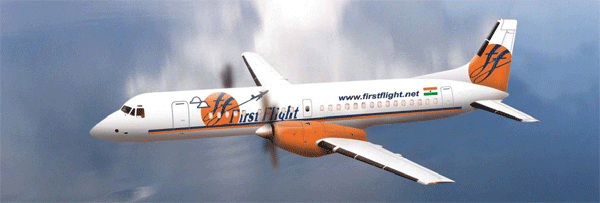What
Slows India All-Cargo?
 BAE is converting ATP Freighters that will be used by First
Flight to start its own Indian domestic freighter operations. The
three aircraft (msn 2039, 2051 and 2054) will be delivered during
the second quarter of 2006 and will be configured as E-Class bulk
freighters similar to the ATP freighter delivered to West Air Sweden,
the company that pioneered this excellent and versatile air cargo
lifter.
BAE is converting ATP Freighters that will be used by First
Flight to start its own Indian domestic freighter operations. The
three aircraft (msn 2039, 2051 and 2054) will be delivered during
the second quarter of 2006 and will be configured as E-Class bulk
freighters similar to the ATP freighter delivered to West Air Sweden,
the company that pioneered this excellent and versatile air cargo
lifter. |
Would-be cargo carriers are
upset that India’s dynamic growth in the domestic passenger airline
business is impacting companies that otherwise might have been planning
to launch their own freighters.
The tremendous growth in air traffic, characterized
by the proliferation and emergence of new low-cost carriers (LCC) in Asia
Pacific, has garnered the interest of foreign investors. Also, an increase
in domestic and international fleet movements as well as fleet utilization
has hiked aviation stocks.
These factors are supporting growth in the
commercial aircraft and engine maintenance, repair and overhauling (MRO)
markets in Asia Pacific.
Frost & Sullivan said recently that
the Asian Pacific Commercial Aircraft & Engine MRO Markets delivered
about $8.71 billion in 2005 and may reach $12.90 billion in 2011.
Frost & Sullivan Industry Manager Subhranshu
Sekhar Das believes that governments in Asia Pacific are striving hard
to liberalize the aviation sector by introducing open skies policies and
permitting domestic airlines to fly abroad.
The domestic cargo carriers or rather the
potential cargo carriers are not happy with that prospect.
The prime reason for their dour mood is
driven by the entry of the new low-cost airlines and induction of more
aircraft by existing and new airlines, which have grabbed much of the
growth in the domestic air cargo business.
India’s domestic airlines today carry
nearly 70 percent of air cargo in the belly of passenger aircraft.
The only cargo company operating its own
freighters in the country, Blue Dart, flies at 100 percent capacity and
has recently made it clear that it is looking to add two more aircraft.
Cargo companies like DTDC, First Flight,
Shreyas and even TNT have shelved their plans to launch their own freighter
aircraft.
Despite all of this, the domestic air cargo
market is predicted to grow at a fast rate of 7 percent. The reason why
local cargo companies are not going all-cargo like Blue Dart is because
it is easier to use the growing fleet of passenger airlines than launch
their own freighter services.
One person who seems happy at the prospect
is Subhasish Chakraborty, the chairman of Bangalore-based DTDC Courier.
He said that the open sky policy was indeed
a boon since it had provided the opportunity to send cargo to various
cities at different times.
 Global
major TNT, for instance, is quite strong in the domestic cargo sector
but it will not go for freighters now. Global
major TNT, for instance, is quite strong in the domestic cargo sector
but it will not go for freighters now.
“There is a whole big fleet of aircraft
available out there,” says Sanjiv Kathuria, (right) head of marketing,
TNT India.
A notable exception is First Flight that
has leased three BAE ATP freighters, which will be deployed to start its
own freight operations.
Founded in 1986, First Flight Couriers Private
Ltd. has developed into India’s largest courier company by volume
with 721 offices spanning 1,800 destinations in the country and serving
229 countries worldwide. FFCL has over 8,000 employees and handles over
150 million shipments every year.
Mr. R.K. Saboo, Deputy Managing Director
of FFCL told FT:
“Our company has grown dramatically
in the past 19 years and we are now poised to enter a new phase of growth
and development with the creation of our own domestic freight airline.
“By having our own aircraft, dedicated
to carrying our own shipments, we can tailor our products to offer an
even better level of service to our customers.
“We are delighted with the ATP Freighter,
which is the best aircraft in the 8-ton class, with a big easy sliding
side door for container loading for our requirements.”
(Tirthankar Ghosh)
|



